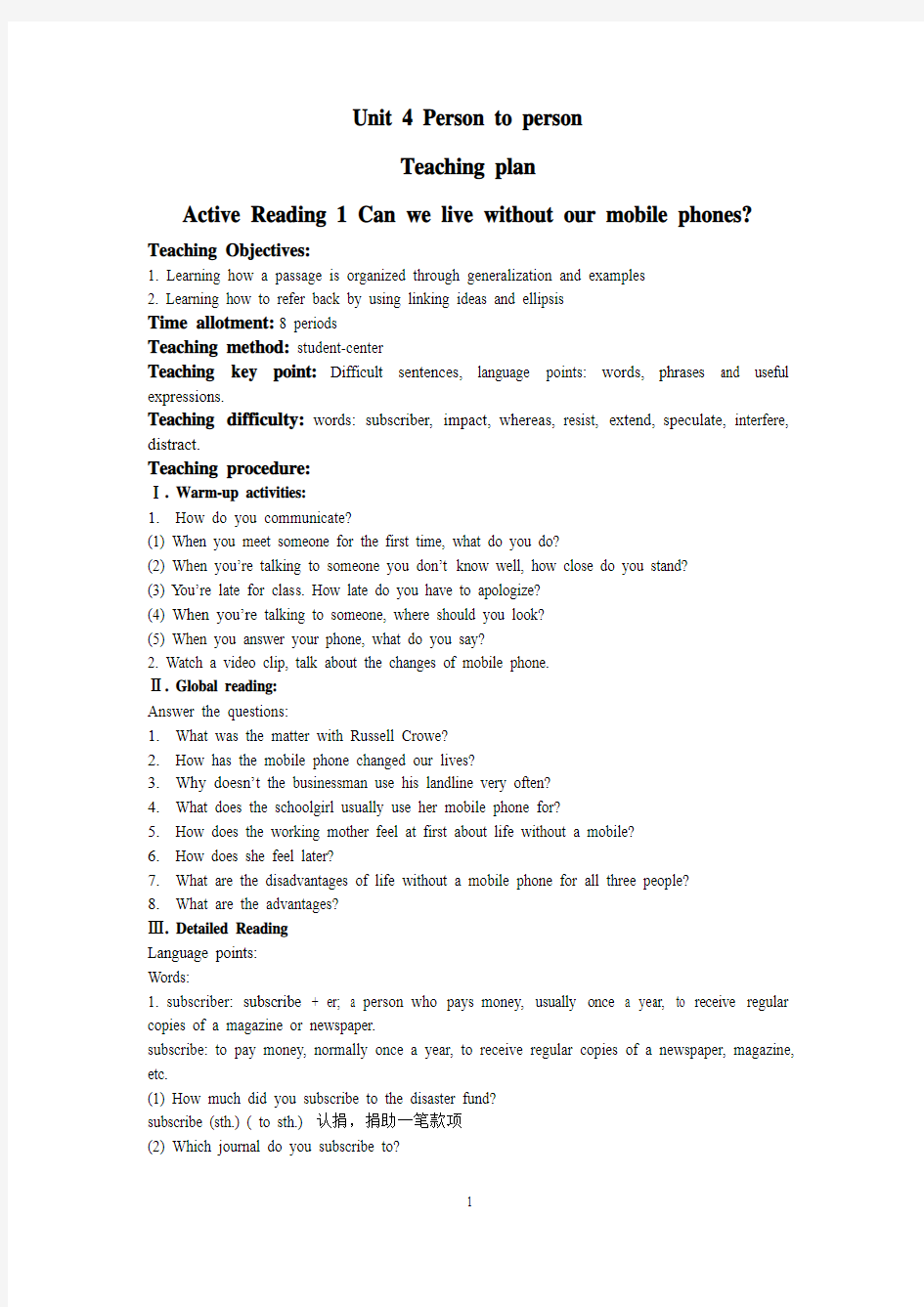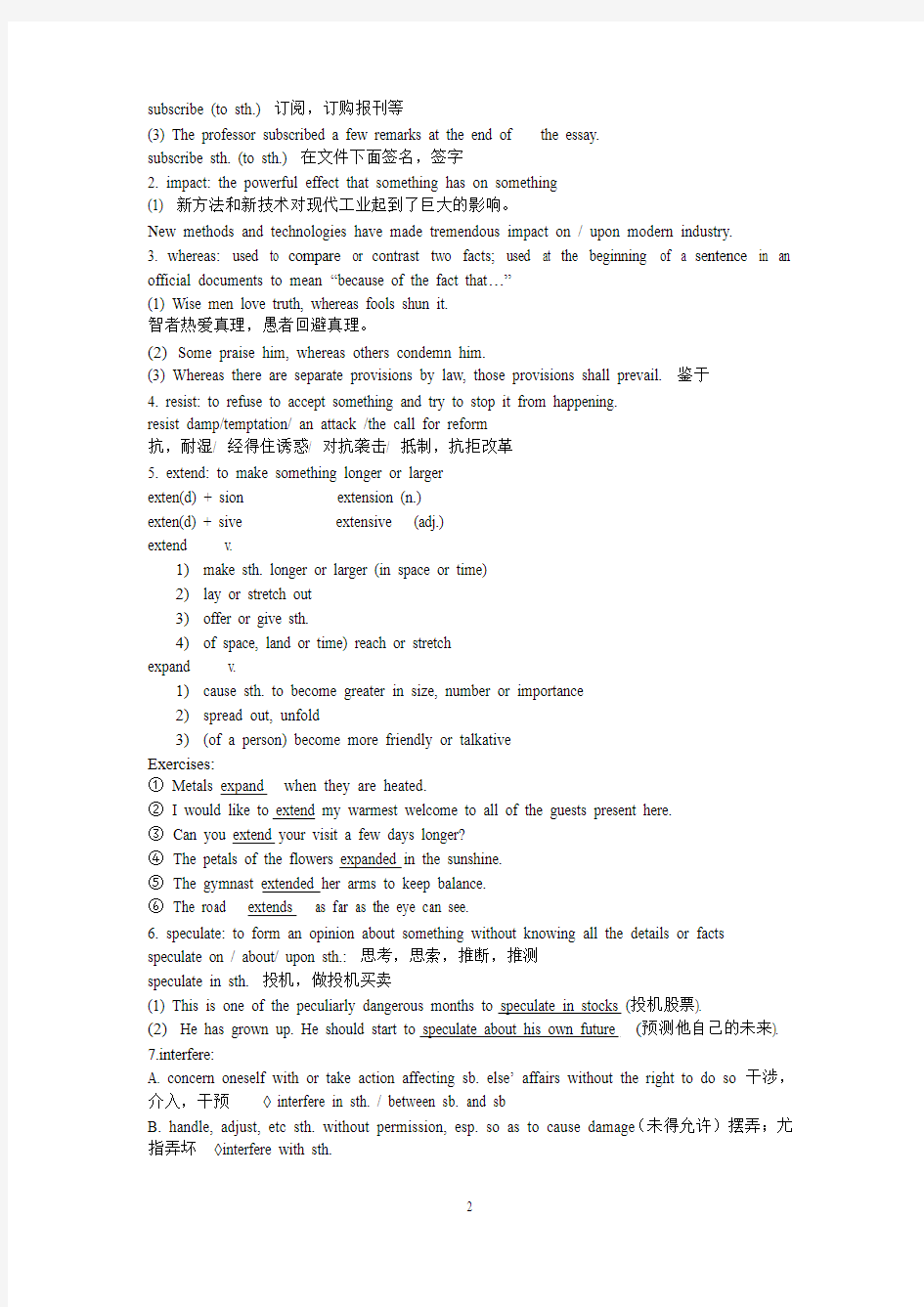Unit 4 Person to person_teaching plan


Unit 4 Person to person
Teaching plan
Active Reading 1 Can we live without our mobile phones?
Teaching Objectives:
1. Learning how a passage is organized through generalization and examples
2. Learning how to refer back by using linking ideas and ellipsis
Time allotment:8 periods
Teaching method: student-center
Teaching key point:Difficult sentences, language points: words, phrases and useful expressions.
Teaching difficulty:words: subscriber, impact, whereas, resist, extend, speculate, interfere, distract.
Teaching procedure:
Ⅰ. Warm-up activities:
1.How do you communicate?
(1) When you meet someone for the first time, what do you do?
(2) When you’re talking to someone you don’t know well, how close do you stand?
(3) Y ou’re late for clas s. How late do you have to apologize?
(4) When you’re talking to someone, where should you look?
(5) When you answer your phone, what do you say?
2. Watch a video clip, talk about the changes of mobile phone.
Ⅱ. Global reading:
Answer the questions:
1.What was the matter with Russell Crowe?
2.How has the mobile phone changed our lives?
3.Why doesn’t the businessman use his landline very often?
4.What does the schoolgirl usually use her mobile phone for?
5.How does the working mother feel at first about life without a mobile?
6.How does she feel later?
7.What are the disadvantages of life without a mobile phone for all three people?
8.What are the advantages?
Ⅲ. Detailed Reading
Language points:
Words:
1. subscriber: subscribe + er; a person who pays money, usually once a year, to receive regular copies of a magazine or newspaper.
subscribe: to pay money, normally once a year, to receive regular copies of a newspaper, magazine, etc.
(1) How much did you subscribe to the disaster fund?
subscribe (sth.) ( to sth.) 认捐,捐助一笔款项
(2) Which journal do you subscribe to?
subscribe (to sth.) 订阅,订购报刊等
(3) The professor subscribed a few remarks at the end of the essay.
subscribe sth. (to sth.) 在文件下面签名,签字
2. impact: the powerful effect that something has on something
(1) 新方法和新技术对现代工业起到了巨大的影响。
New methods and technologies have made tremendous impact on / upon modern industry.
3. whereas: used to compare or contrast two facts; used at the beginning of a sentence in an official documents to mean “because of the fact that…”
(1) Wise men love truth, whereas fools shun it.
智者热爱真理,愚者回避真理。
(2)Some praise him, whereas others condemn him.
(3) Whereas there are separate provisions by law, those provisions shall prevail. 鉴于
4. resist: to refuse to accept something and try to stop it from happening.
resist damp/temptation/ an attack /the call for reform
抗,耐湿/ 经得住诱惑/ 对抗袭击/ 抵制,抗拒改革
5. extend: to make something longer or larger
exten(d) + sion extension (n.)
exten(d) + sive extensive (adj.)
extend v.
1)make sth. longer or larger (in space or time)
2)lay or stretch out
3)offer or give sth.
4)of space, land or time) reach or stretch
expand v.
1)cause sth. to become greater in size, number or importance
2)spread out, unfold
3)(of a person) become more friendly or talkative
Exercises:
①Metals expand when they are heated.
②I would like to extend my warmest welcome to all of the guests present here.
③Can you extend your visit a few days longer?
④The petals of the flowers expanded in the sunshine.
⑤The gymnast extended her arms to keep balance.
⑥The road extends as far as the eye can see.
6. speculate: to form an opinion about something without knowing all the details or facts speculate on / about/ upon sth.: 思考,思索,推断,推测
speculate in sth. 投机,做投机买卖
(1) This is one of the peculiarly dangerous months to speculate in stocks (投机股票).
(2)He has grown up. He should start to speculate about his own future (预测他自己的未来).
7.interfere:
A. concern oneself with or take action affecting sb. else’ affairs without the right to do so 干涉,介入,干预? interfere in sth. / between sb. and sb
B. handle, adjust, etc sth. without permission, esp. so as to cause damage(未得允许)摆弄;尤指弄坏?interfere with sth.
C. prevent sth, from being done or carried out properly 阻碍,妨碍,妨害? interfere with sth.
D. distract or hinder sb. 干扰或妨碍某人?interfere with sb.
(1) I am afraid the unexpected incident will interfere ( C ) with my plan.
(2) It’s wise not to interfere ( A) between husband and wife.
(3) Don’t interfere ( A ) in the business that does not concern you.
(4)Don’t interfere ( D ) with your father when he is doing his experiment. Y ou may interfere ( B )
with his equipment.
9.distract: to take somebody’s attention away from what they are trying to do
distract sb. (from sth.) 使某人分心
distracted adj. (with / by sth.) 精神不能集中的
distracting adj. 分散注意力的
distraction n. 注意力不集中;使人分心的事物
The unexpected news distracted him from his work. He couldn’t go on with his work because of the distraction. He was distracted with great anxiety, so he turned on the TV, hoping the distracting program can calm himself down.
Phrases:
1. end up: to find yourself in a place or situation that you did not intend or expect to最终······
(1) If you continue to steal you will end up in prison (终归得进监狱).
(2)At first, he refused to accept any responsibility, but he will end up apologizing (到头来还是
道了歉).
(3)If he carries on driving like that, he will end up dead (终究要送命).
Sentences:
1. Mobile phones have been the biggest factor of change in everyday behavior in Britain over the past 15 years. Today it is thought that there are more than 55 million mobile phone subscribers, a rise from less than 10 million in 1997.
We can often use over to mean “during a period of time“. But it sounds strange for periods of time shorter than two days.
With some verbs, such as say, believe, think, feel, claim, report, estimate, announce, suggest, we can start the sentence with it + passive voice. We can use this sentence pattern when we’re quoting someone or something, but we’re not sure of the truth of the statement or we w ant to distance ourselves from it. We often see this sentence pattern in news or factual reports. 这里的it is thought可以译为据估计。
在过去的15 年里,手机已成为改变英国人日常行为方式的最主要的因素。据估计,目前英国手机用户已超过5,500 万,而在1997 年还不足1,000 万。
Useful expressions:
the biggest factor of change in everyday behavior改变人们日常行为方式的最主要因素, mobile phone subscriber 手机用户, famous tourist sights 著名的旅游景点, go (be) beyond the reach of …在可获得的范围之外, switch on/off the mobile phone 开机/关机, text (message) or send text messages 短信/ 发短信, reach me on my landline 打我的座机和我取得联系, call me urgently on my mobile 紧急地打我的手机, end up quite angry 最后感到非常愤怒, slow down .(使)慢下来;(使)缓行, don’t make plans until the last minute不到最后一分钟不做打算, on the plus side 从有利方面看, on (an) impulse凭一时冲动, computer isn’t working电脑坏了, make arrangements for my social life安排社交生活, essential必需品, luxury奢侈品, make a fuss大惊小怪, therapy for the soul心灵治疗, interfere with my daily routine干扰我的日常生活
ⅣClassroom Activity
Work in pairs and discuss the questions:
1.Do you agree that mobile phones have been the biggest factor of change in everyday
behavior?
2.Do you agree the size of the handset affects the number of calls you make?
3.Does your mobile phone allow you to act without thinking about the consequences?
4.How important is your mobile phone for your social life?
ⅤSummary
Mobile phones have been the biggest factor of change in everyday behavior. An increasing number of subscribers make more calls and take decisions that make an impact on their lifestyle more quickly. At the same time, the world has become smaller due to the wide use of mobile phones. In order to test whether people can live without mobile phones, the researchers ask three people to switch off their mobile phones for three days.
The businessman loses his social life, but he is less likely to act on an impulse. Moreover, not having a phone creates more time for him to think. The schoolgirl can’t speak to her friends or make arrangements for her social life without her mobile phone, but she feels more independent.
The working mother, switching off her phone, feels anxious at first, but later on she finds that life can be solitary without anyone distracting her or interfere with her daily routine, so she feels it’s like therapy for the soul.
ⅥAssignment
Fill in the blanks of exercise 6.
感受现代科技
感受现代科技 【学习目标】 1、知识:感受现代科技给人类生活带来的新变化,认识科技与生活,科技发展与社会发展的关系,懂得“科学技术是第一生产力”的道理。 2、能力与情感:感悟现代科技的神奇与力量,理解科技是社会发展的强大推力,激发学生 对科技重要性的认识,增强学生对科学的兴趣,培养学生热爱科学的精神。 3、过程与方法:依据教学内容和学生的认识规律设置了“课前预习”、“课堂助学”、“课堂巩固”、“课后拓学”、“教学反思”五个模块的教学整合,运用多媒体等教学手段,采用自主体验、 探究活动、案例情境等方法来完成教学目标。 【学习重点、难点】 领略现代科技的神奇与力量,理解“科技是第一生产力”。 【学习过程】 一、预习初探: (一)快快行动,书外的知识真有趣: 1、生活体验:观察生活,请你说说我们身边有哪些科技产品?例举实例说说这些科技产品给我们的生活带来哪些新变化? 2、想象天地:展现你的想象天份,想象你准备发明一样科技产品,使你的未来生活更美好。 3、图片收集:上网收集有关科技产品的图片,准备创办科技小展览,领略现代科技的神 奇与力量。 (二)阅读课本,书本的知识真寻味: 4、我们现在的生活与科技________________。丰足的衣食,舒适的住行,千百年来一直是人类_________________。 5、科学技术是________________的强大推力,是________生产力。______________已成为当代经济发展的火车头。 6、________________是人类文明的标志。科学技术的进步为人类创造了巨大的 ______________和_________________。
感受现代科技
第十四课感受现代科技 项目一现代科技在身边 教师寄语:今日沟通于昔日之最大差异:在于科技的介入,已超越时间、空间,甚至权利与阶级的围墙。 学习目标: ●情感态度价值观:感受现代科技发展带来的新变化,培养学生热爱科学的情感和品质。 ●能力:培养学生观察、收集、整理、归纳信息的能力。 ●知识:了解科技对社会发展具有推动作用,理解科学技术是第一生产力。 重难点:科技是社会发展的强大推动力 学习过程: 一、课前预习(提前预习课本,顺便做以下小题,相信你能完成!) 1.我们现在的生活与科技_________。 2.___________________是第一生产力。 3._______________已成为当代经济发展的火车头。 4.科学技术是_______________的标志。 5.科技是社会发展的______________。 二、合作探究,共同进步(合作有助于提高学习效率,要努力哦!) 知识点一:现代科技给生活带来新变化 1:(见教材P58页-59页)图片1:液晶彩色电视图片2:利用网络学习 图片3:山里人用上了手机图片4:磁悬浮列车 说一说:观察生活,列举实例,说说现代科技给我们的生活带来哪些新的变化? 2:阅读教材(P59页教材正文),说说现代科技的发展给人类的生活产生了怎样的影响?(学生讨论交流) 。3:(见教材P59页-60页)想象和推测一下,随着科技的发展,5年、10年、20年、50年后人们的生活可能是怎样的? 。 知识点二:科技——社会发展的强大推力 1:(见教材P61页),材料中的数字变化说明了什么?(学生讨论交流) 上述材料中的数字变化说明:“”。 2:为什么说“科学技术是第一生产力”? ① ② 实践证明:高新技术及其产业已经成为当代经济发展的火车头。 3:(见教材P62页)说一说:网络学校的发展将会给人们的学习方式带来了哪些变化? 4、①科学技术的进步使精神文明建设有了新的载体. 说一说:在思想文化传播的载体方面,你知道有哪些新的传播手段呢? ②科学技术的进步丰富了人们的 . 5、科学技术的进步为人类创造了巨大的财富和财富 三、课堂小结 通过学习我学会:
走进都市农业 感受现代科技
走进都市农业感受现代科技 --"大东农业观光园"基地实践活动 设计者:大兴区第九小学窦雪征 指导教师:大兴区教师进修学校柏东河 ( 2008-05-27 13:40:19 ) 一、环境分析 我国是个农业大国。当前,在农业科技领域,中国不断缩小与发达国家的差距,农业科技部门在生物技术、高新技术、基础研究方面均取得较大进展,植物细胞和组织培养、花药培养、单倍体育种及其应用研究处于国际先进地位。但是,作为国家希望的小学生却对我国农业的了解知之甚少,甚至有的学生只认识餐桌上的蔬菜,田地里面的蔬菜就不认识了。而且由于社会环境的影响,学生对于农业生产的认识非常极端,认为农业生产只是辛苦的体力劳动,对其间蕴含的高科技文化知识基本不了解。 大兴区作为北京市的一个远郊区县,拥有着得天独厚的农业教育资源,在我们的身边就有向"大东农业观光园"这样的一个很好的农业教育基地。在大东农业观光园里面充分体现了现代农业。它目前拥有现代化日光温室34个,塑料大棚34个,露地80亩,为观光采摘、实验、示范、生产提供了场所。农业观光园里引进福建有机茶叶树,通过土壤改质能使其在北方正常生长;蔬菜嫁接的试验技术;大棚中的科学技术,如:所有地面具备节能、日光温室跨度大、内设供热、微喷、保湿、补光等多项功能;另外园区内设有科普知识长廊,为学生了解我国农业的历史文化和发展,创造了很好的条件。此基地实践活动适合小学高年级学生,他们可以在基地里面,进行参观、体验、学习了解高科技农业技术。通过基地的实践活动,可以增长学生现代农业知识,提高劳动能力,体验劳作的艰辛,培养学生良好的道德品质。可以很好的促进学生学习方式的变革,使学生直接从事实践性主题活动,实现学生自主学习和直接体验为主的学习方式,从而不
